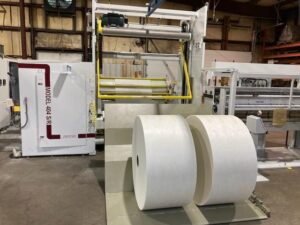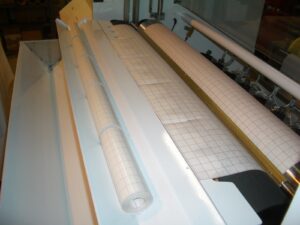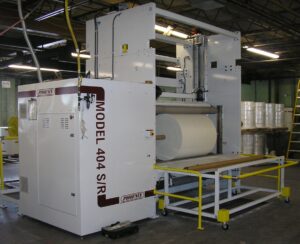
Understanding Center Winders and Their Role in Converting Equipment
Michael Coulson | March 5, 2025
Introduction
The world of converting equipment relies on precision, efficiency, and adaptability. Among the many types of machinery available, center winders stand out as an essential component in slitter rewinder machines. These machines have evolved to handle multiple applications, making them a valuable asset for manufacturers dealing with films, laminates, non-wovens, tapes, and flexible packaging. In this post, we will explore the key features, applications, and benefits of center winders, helping you understand why they are a benchmark in the industry.What Are Center Winders?
Center winders are specialized machines used in web handling equipment to wind materials onto a core with consistent tension control. They are designed to process a variety of substrates, ensuring that the finished roll maintains its integrity and quality. These machines use a central winding shaft to apply controlled tension, allowing for smooth, precise winding of materials.Key Features of Center Winders
- Closed or Open Loop Rewind Tension Control – Ensures consistent tension throughout the winding process, preventing material distortion and improving roll quality.
- Bi-Directional Rewinding – Allows materials to be wound in either direction, providing flexibility for different processing needs.
- Top Riding Rolls (Lay-On Rollers) – Helps to evenly distribute pressure across the material, reducing air entrapment and ensuring uniform roll structure.
- Minimum Gap Feature – Reduces tension spikes and prevents material wrinkling, making it ideal for delicate films and flexible packaging.
- Multiple Slitting Options – Equipped with shear slitters, score slitters, and razor slitters, allowing for precise cutting of various substrates.
- Quick Turnover Capabilities – Designed for high-speed processing, reducing downtime and increasing production efficiency.
Applications of Center Winders
Center winders are widely used in various industries, including:- Flexible Packaging – Ensures precise winding of thin films used in food and medical packaging.
- Non-Wovens – Ideal for materials like hygiene products, wipes, and filtration media.
- Tapes & Adhesives – Handles pressure-sensitive adhesives without causing deformation or stretching.
- Laminates & Specialty Materials – Enables controlled winding of multi-layered substrates used in industrial and commercial applications.
- Enhanced Product Quality – By maintaining uniform tension, center winders prevent material defects, leading to higher-quality finished rolls.
- Increased Efficiency – Quick turnover and high-speed operation improve production rates, reducing downtime and maximizing output.
- Versatility – Capable of handling a wide range of materials, making them suitable for diverse manufacturing environments.
- Reduced Material Waste – Precision control minimizes scrap, leading to cost savings in raw materials.
- Improved Safety & Reliability – Advanced tension control systems ensure smooth operation, reducing the risk of machine failures and operator errors.
Choosing the Right Center Winder for Your Business
When selecting a center winder, it’s important to consider the specific needs of your production line. Factors such as material type, roll diameter, web width, and slitting requirements play a crucial role in determining the right machine. If you’re in the market for a new slitter rewinder or considering a used slitter rewinder, working with a reputable slitter rewinder manufacturer ensures you get the best solution for your needs.Conclusion
Center winders have become an industry benchmark due to their precision, efficiency, and adaptability. As a key component of industrial rewinders and web handling equipment, they continue to play a vital role in converting equipment across multiple industries. By investing in high-quality American-made converting equipment, businesses can achieve superior performance, reduced waste, and increased production efficiency.Stay tuned for our next post, where we will explore center-surface and center-minimum gap winders and their importance in tape slitting machines, label converting equipment, and nonwoven slitter applications.
Recent Post
-
Engineering High-Efficiency Converting with Surface Winders
Michael Coulson | May 27, 2025
-
Choosing the Right Surface Winder for Your Business
Michael Coulson | May 20, 2025
-
The Evolution of Surface Winders in Converting Applications
Michael Coulson | May 14, 2025
-
Solving the Machinery Maintenance Crisis—With Phoenix Machine
Michael Coulson | May 1, 2025
-
How to Choose the Right Slitter Rewinder for Your Business
Michael Coulson | March 19, 2025


